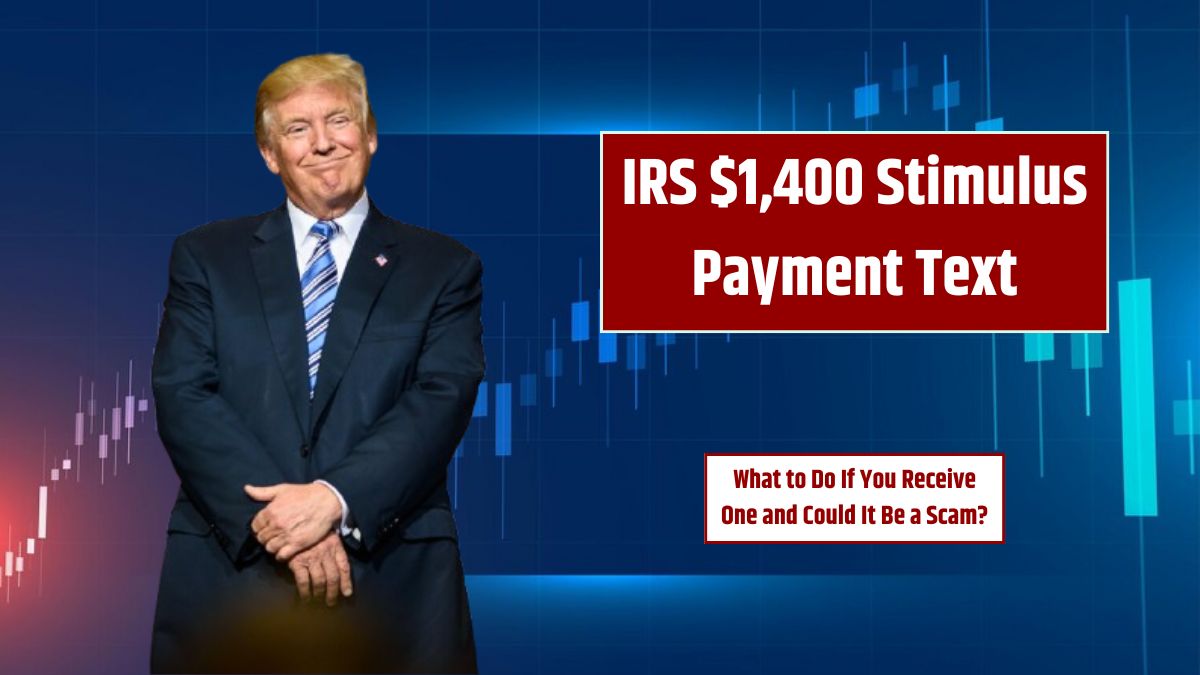Tax season is always a busy time for fraudsters looking to take advantage of unsuspecting taxpayers. One of the most common scams detected in 2025 involves text messages claiming eligibility for a $1,400 stimulus payment. These fraudulent messages trick individuals into sharing personal information, potentially leading to identity theft and financial loss.
Knowing how these scams work and how to protect yourself is essential to ensuring your financial security.
Scam
Scammers have been sending text messages that appear to come from the IRS, promising recipients a $1,400 Economic Impact Payment. These messages often include a link that directs users to a fake IRS website, where they are asked to provide personal details such as Social Security numbers and banking information.
A typical fraudulent message might say:
“You are eligible to receive an economic impact payment of $1,400. Please provide your accurate personal information. We will deposit the amount into your bank account or send you a paper check within 1 to 2 business days.”
The truth is that the IRS never requests personal or financial information via text, email, or phone calls. Stimulus payments were automatically distributed, and no additional action was required from taxpayers. If you receive such a message, it is a scam.
Tactics
Scammers use various techniques to make their messages look legitimate. Some common tactics include:
- Impersonating the IRS – They use official-looking logos and language that mimics real IRS communications.
- Creating urgency – They make it seem like you need to act quickly, which pressures victims into making hasty decisions.
- Including fake links – These links direct users to fraudulent websites designed to steal personal data.
- Using smishing and phishing – Smishing involves fraudulent text messages, while phishing refers to fake emails or websites.
Consequences
Falling victim to one of these scams can lead to severe consequences, including:
| Consequence | Description |
|---|---|
| Identity Theft | Fraudsters can use stolen information to open credit accounts in your name. |
| Financial Loss | Scammers may access your bank account and withdraw funds. |
| Tax Fraud | They can file false tax returns using your Social Security number. |
| Credit Damage | Unauthorized financial activity can harm your credit score. |
Protection
To protect yourself from IRS-related scams, follow these precautions:
- Ignore suspicious messages – If you receive an unsolicited text or email about a stimulus payment, delete it immediately.
- Never click on links – Even if a message appears official, avoid clicking on any links. Instead, visit the IRS website directly by typing IRS.gov into your browser.
- Verify IRS notices – The IRS communicates primarily through mail. If you are unsure about a message, contact the IRS directly.
- Report scams – Forward suspicious texts to phishing@irs.gov and report them to the Better Business Bureau Scam Tracker at BBB.org/ScamTracker.
Steps
If you receive a suspicious message, take these steps:
- Do not respond – Engaging with scammers can lead to further fraud attempts.
- Delete the message – Remove it from your phone to avoid accidentally clicking on links.
- Report it – Use your phone’s “report junk” or “report phishing” option.
- Monitor your accounts – Regularly check your bank statements and credit reports for unusual activity.
Tax season is a prime time for scammers, but staying informed and cautious can help you avoid falling victim. The IRS will never ask for personal information via text or email, so if you receive such a request, it’s a scam. When in doubt, always verify information directly with the IRS and report any suspicious messages to protect yourself and others.
FAQs
How do IRS scams work?
Scammers send fake IRS messages to steal personal information.
Can the IRS contact me by text?
No, the IRS does not send unsolicited texts about payments.
What should I do if I get a fake IRS text?
Delete the message and report it to phishing@irs.gov.
Are stimulus payments still available?
No, stimulus payments were distributed automatically in 2021.
How do I check real IRS notices?
Visit IRS.gov or call the IRS directly to verify.






